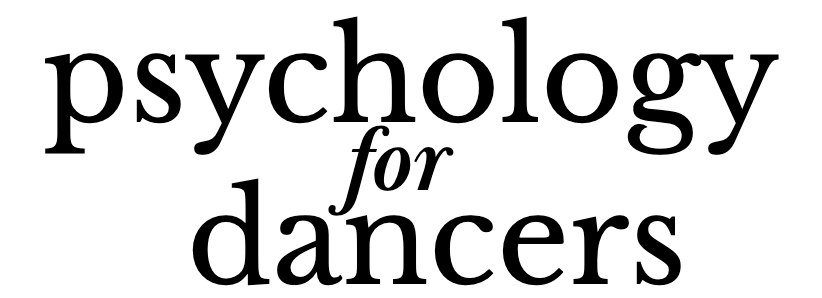What is Dance Psychology? Insights for Dancers and Viewers
Dance psychology is a field of applied psychology that takes dance as its subject of study. Broadly, it can be divided into two main areas:
The study of dancers’ psychology.
The study of people watching dance.
The Psychology of Dancers
When it comes to dancers, research looks at both amateurs and professionals.
Amateur dancers: Studies often focus on how dance contributes to happiness and overall well-being. In simple terms, how dancing helps people feel better in their daily lives (1).
Professional dancers: Here, the focus shifts toward performance–how to thrive on stage, in rehearsals, and even outside the studio. The ultimate goal is not only success in performance but also enhanced well-being (2).
This perspective is closely connected to sport psychology, since both fields explore techniques to improve performance. In a broader sense, dance psychology can be considered part of performance psychology: the study of how humans can optimize their abilities in any domain.
How Does Dance Influence Us as Viewers?
Dance psychology also pays attention to audiences. Researchers investigate how we make sense of dance performances, even without spoken words. Terms such as kinesthetic empathy or somatic empathy describe how viewers can physically and emotionally resonate with the movement they see on stage (3).
And you might be wondering: what about dancers watching dance? Does it make a difference if the person in the audience actually knows how to do a plié? Turns out, yes. Research shows that dancers’ brains light up in certain areas much more than non-dancers’. In other words, experience in dance doesn’t just make you better at moving. It also makes you better at understanding what’s happening on stage (4).
Dance Psychology, Psychology of Dance, or Dance Therapy?
And here’s where psychologists make things extra fun: they invent five different terms for the same thing and then argue about it at conferences.
Dance psychology and psychology of dance are essentially the same thing: the study of the psychological aspects of dance. Nothing more, nothing less.
Dance therapy, however, is something else. More precisely, it is dance and movement therapy, a recognized psychotherapeutic approach that helps people work through challenges using movement. Contrary to popular belief, it’s not just for dancers. It’s open to anyone who wants to explore therapy beyond words. You can find more information on the American Dance Therapy Association website.
What Can You Expect on This Blog?
This blog is dedicated especially to those who actively dance. That means I won’t be focusing much on audience psychology, but rather on how dance influences us when we are the ones moving.
That’s not to say the other perspective isn’t fascinating. Books like The Neuropsychology of Dance by Bettina Blässing and her colleagues deserve a spot on any dancer’s shelf. Still, I often find that while research in this area exists, it rarely makes its way into the practical world of dance.
And yet, psychology in dance is impossible to ignore. In fact, it’s a bit like Wi-Fi: always present, absolutely essential, but invisible, until it stops working. And when it does, dancers are often left unsure where to turn. Directors, choreographers, rehearsal coaches, or ballet masters usually aren’t prepared to fill this role.
And that’s where I come in.
Sources
Burkhardt J, Brennan C. The effects of recreational dance interventions on the health and well-being of children and young people: A systematic review. Arts & Health. 2012;4(2):148-161. doi:10.1080/17533015.2012.665810
Nordin-Bates S. Essentials of Dance Psychology. Human Kinetics; 2022.
Reason M, Reynolds D. Kinesthesia, Empathy, and Related Pleasures: An Inquiry into Audience Experiences of Watching Dance. Dance Res J. 2010;42(2):49-75. doi:10.1017/S0149767700001030
Calvo-Merino B, Glaser DE, Grèzes J, Passingham RE, Haggard P. Action Observation and Acquired Motor Skills: An fMRI Study with Expert Dancers. Cerebral Cortex. 2005;15(8):1243-1249. doi:10.1093/cercor/bhi007
